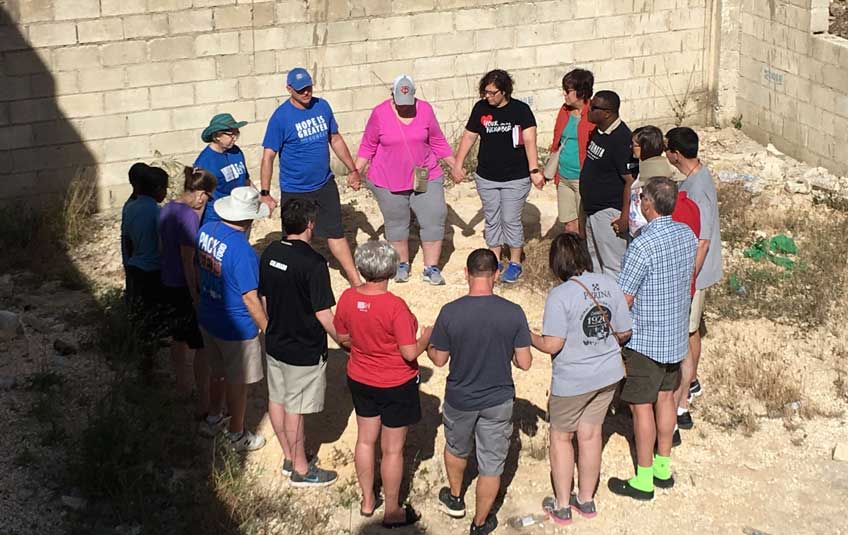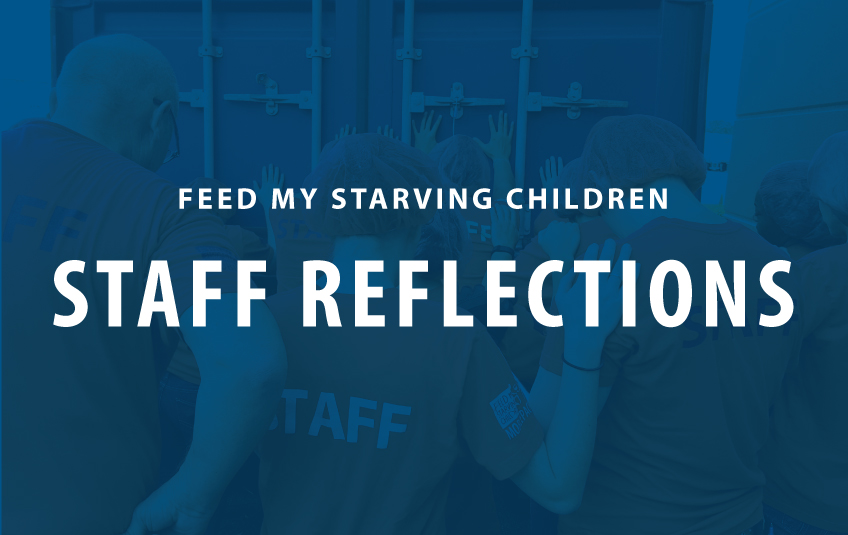The Feed
Stories of Feeding God's Children Hungry in Body & Spirit
This post is part of a series of reflections from Feed My Starving Children employees about what it is like to work at a faith-filled organization during a time of crisis. Carrie Wiggins, Regional MobilePack™ Advisor, shares thoughts on lamenting during the pandemic. She has been with FMSC for 3 years.
In my time working at FMSC I have felt deeply cared for, comforted in times of pain and challenged deeply to grow both as an individual and in my relationship with God.
You see, working at FMSC makes my world both larger and smaller. Larger as I engage with a global community; smaller as I befriend and stay connected with special people from individual communities around the world. This has introduced me to many beautiful ways to worship the Lord and to new (to me) perspectives of world. This brings absolute joy but also tension.

It is often a challenge to reconcile situations I face at home with what our friends and partners face around the world. Working at FMSC provides a window into injustices that are perpetrated on innocent victims. It reminds me that the most vulnerable in this world are often the first casualties of natural disaster, famine, corruption, conflict, war, inequality, displacement, isolation and disease.
While I don’t face these trials myself, I am still left to wrestle with them. So, what do I do with it? How do I respond to those things that weigh on my heart and soul? As my relationship with God has matured in my time at FMSC, I have learned what to do: worship God through lament.
“Lament talks to God about pain. And it has a unique purpose: trust. It is a divinely-given invitation to pour out our fears, frustrations, and sorrows for the purpose of helping us to renew our confidence in God.”
In his post, “Dare to Hope in God – How to Lament Well,” Indiana pastor Mark Vroegop writes, “Lament talks to God about pain. And it has a unique purpose: trust. It is a divinely-given invitation to pour out our fears, frustrations, and sorrows for the purpose of helping us to renew our confidence in God.” He outlines the four elements of lament as illustrated in Psalm 13:
- Turn to God – this is choosing to talk to God about what is happening.
- Bring Your Complaint – this is honestly and humbly identifying the pain, fear, questions and frustrations that are raging in our soul.
- Ask Boldly for Help – this is seeking and daring to hope in God’s promises as we ask for His help.
- Choose to Trust – this prayer language moves us to renew our commitment to trust in God and the hope He provides as we navigate this broken world.
Bringing a complaint before the Lord can be absolutely terrifying. However, we must remember that God actually invites us to honestly evaluate what we are seeing or experiencing and pour out our great sorrow to Him. It can be uncomfortable, but it leads us to deeper relationship with God, gives us the strength to ask for His help, and helps us trust God to respond to our prayers on the basis of His character: unconditional love, mercy and justice.
This lesson, learned from fellowship with amazing people at FMSC and the work that the Lord is doing in my heart has prepared me not only for our daily work, but also for the uncertainty that comes at a time like this.

When faced with a global pandemic and wrestling with the impacts of the virus itself and our efforts to “flatten the curve,” I know that I can turn to the Lord in lament. I can choose to talk to God about what is happening. I can know that He has invited me to bring my distress, questions and frustrations to Him. I can sit in that space as long as I need to and then I can boldly ask for His help and trust Him to respond in His way and in His perfect time.
This is a gift. Thank you friends and thank you God, for this blessing of a healthy and biblical process that leads me to hope. Hope for today and hope for the day that the Lord will bring an end to all laments.
“He will wipe away every tear from their eyes, and death shall be no more, neither shall there be mourning, nor crying, nor pain anymore, for the former things have passed away” (Revelation 21:4, ESV).Subscribe to The Feed
We'll periodically send stories of hope to your inbox.




